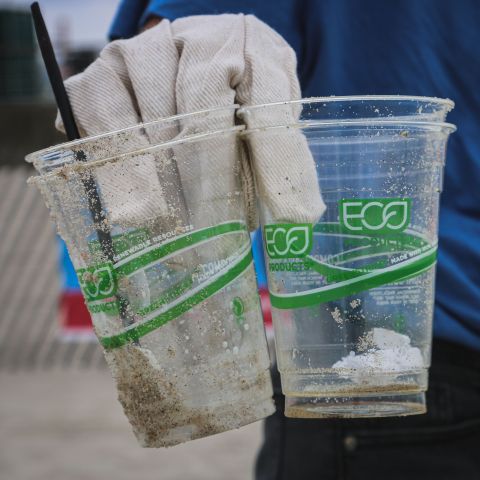
Starting from 1 July 2023, there will be a ban, restriction, or phase-out of single-use plastic items, and this information applies to businesses, industries, and the general public.
The Waste Minimisation (Plastic and Related Products) Regulations 2022 were issued in March 2022 and amended in November 2022 [New Zealand Legislation website]
Single-use:
- plastic produce bags
- plastic plates, bowls and cutlery
- plastic straws*
- plastic produce labels
*Plastic straws will be available for disabled people and medical use.
Starting 1 July 2023, the sale of single-use plastic drinking straws will be restricted to individuals with disabilities and health conditions only.
A drinking straw intended for one-time use and contains any form of plastic, including compostable or biodegradable plastic.
- Reusable plastic straws, including silicone straws
- Single-use plastic drinking straws that are attached to beverage boxes by a machine (such as juice or milk boxes) or are an inherent part of the packaging will be exempt from the regulations until January 1st, 2026.
Individuals with disabilities or health conditions (or their representatives) will have the option to acquire and utilise single-use plastic drinking straws if required.
Plastic straws may be necessary for nutritional purposes, maintaining independence, and/or promoting social inclusion. Alternatives may not always be appropriate or safe and can be more costly and challenging to maintain hygiene.
Entities and businesses authorised to distribute or sell single-use plastic drinking straws
As per the regulations, certain entities and businesses are authorised to distribute or sell single-use plastic drinking straws to individuals who require them, and these include:
- supermarkets
- pharmacies
- hospitality businesses
- education entities
- charitable entities
- health and disability support services.
Manufacturers or wholesale suppliers may supply single-use plastic drinking straws to any of the aforementioned entities.
Additionally, individuals with disabilities or health conditions will continue to have access to purchasing single-use plastic drinking straws from online retailers.
Guidelines for businesses and authorised entities that are allowed to distribute or vend single-use plastic drinking straws
Single-use plastic drinking straws can be made available upon request, and individuals (or their representatives) are not obligated to clarify their disability or health condition or present proof of their need for plastic straws. Plastic straws must not be openly displayed.
A broad range of substitutes for single-use plastic drinking straws is now readily accessible. These include:
- reusable straws (eg, metal and silicon)
- paper straws
- going without a straw altogether
Starting 1 July 2023, the production and sale of disposable plastic tableware and cutlery will be prohibited.
Tableware and cutlery
- Entirely or mostly composed of any form of plastic, including recyclable, compostable, or biodegradable plastic.
- Intended to be used once or a few times before being discarded.
Prohibited tableware consists of disposable plastic bowls, plates, and platters.
Prohibited cutlery includes single-use forks, spoons, teaspoons, knives, and chopsticks, as well as cutlery that is incorporated into the packaging of a food product (such as single-serve ice cream or salad packs).
Disposable plastic tableware and cutlery are commonly used at events such as food markets, parties, festivals, community gatherings, and sports groups.
The ban excludes:
- Plastic containers with lids (excluding polystyrene bowls and containers with lids)
- Plastic items not for food preparation or eating (eg, measuring spoons for medicine, infant formula or washing powder)
- Tableware made of other materials (eg, paper, bamboo, sugarcane pulp) that have plastic linings.
Note: polystyrene bowls and containers with lids (plastic type 6) have already been banned — See plastic products banned from October 2022
There are many alternatives to single-use plastic tableware and cutlery, such as:
- Reusable tableware or cutlery made of materials like ceramic, stainless steel, or melamine plastic.
- Paper or bamboo tableware or cutlery, preferably without intentionally added Perfluoroalkyl and Polyfluoroalkyl Substances (PFAS). For more information on PFAS, see key terms for more information on PFAS
Starting 1 July 2023, the production and sale of plastic produce bags will be prohibited.
Single-use plastic produce bags are plastic bags that are provided by stores or retailers to pack fresh fruits and vegetables at the point of sale and are designed to be used only once.
The prohibition pertains to those made of:
- recyclable plastic
- biodegradable plastic
- plant-based or compostable plastic.
The ban on single-use plastic produce bags has no exemptions.
The prohibition does not extend to single-use plastic bags that are incorporated into the packaging for pre-packaged produce, defined as fruits or vegetables that are bagged (whether sealed or unsealed) prior to being made available for purchase.
Hence, the ban excludes plastic bags that constitute or are part of the packaging, such as pre-packaged mesclun lettuce, sealed bags of apples, potatoes, or sugar snap peas, leafy greens and herbs in a plastic sleeve, or bagged lettuce.
Although single-use plastic produce bags are prohibited, the following substitutes are acceptable:
- Produce bags made of fibre-based materials, such as paper. The Ministry recommends choosing fibre-based products that do not contain Perfluoroalkyl and Polyfluoroalkyl Substances (PFAS). For further information on PFAS, please refer to the key terms section.
- Reusable produce bags that are not single-use. An item is considered single-use if it is designed or intended to be used only once or a limited number of times before being disposed of, discarded, or diverted.
- It is also possible to forego a bag entirely when selecting produce for purchase
Starting 1 July 2023, the sale of non-compostable plastic produce labels will be phased out.
Labels affixed to fruits or vegetables using materials that do not meet the standards for home compostability are called non-compostable plastic produce labels.
For a produce label to be considered compostable at home, it must meet either of the following criteria:
- AS 5810-2010 Biodegradable Plastics standard, biodegradable plastics that are appropriate for home composting
- NF T51-800 Plastics, specification for plastics that are suitable for home composting
Moreover, any plastic label attached to domestically grown produce meant for local distribution should be certified as home compostable.
- Produce labels intended for export are not subject to these regulations. The regulations aim to reduce plastic contamination in the environment of Aotearoa New Zealand.
- Produce labelled before July 1, 2023, and already in the supply chain are exempt from these regulations.
- The use of home compostable adhesive for label glue is not mandatory until July 1, 2025. Label manufacturers around the world are currently developing this type of adhesive, which is expected to be available by 2025.
- Imported produce labels are not required to be home compostable until July 1, 2025. This is to avoid the cost of removing labels from imported produce and to allow other countries to transition to home compostable labels.
- Do your labels consist of plastic that lacks certification as home compostable?
- Are your labels designed to adhere to fruits or vegetables?
- Are your labels intended for use on produce sold in New Zealand?
If you answered “yes” to all of the questions, then your produce label is covered by the ban.
- If feasible, consider providing produce without labels.
- Signage and alternative labelling methods can be used by growers, distributors, and retailers to convey information about produce throughout the supply chain and at the point of sale to customers.
Consider the following questions to help determine if a plastic item is considered single-use and thus included in the ban:
- Question 1: Does the item contain plastic (including bio-based or compostable plastics)? If not, it is not banned. Note that plastic-lined bowls and plates, as well as home compostable produce labels, are not included in the ban. Additives and inks that contain resins are not banned unless found in home compostable produce labels.
- Question 2: Is the item listed in the banned items list? If not, it is not banned.
- Question 3: Is the item designed or intended to be used only once or a limited number of times before being disposed of?
- Question 4: Is the item usually provided in settings where it is only used once (e.g. at a food market with no reuse system) or given for free or at low cost?
- Question 5: Is the item marketed as disposable or single-use, encouraging disposal after limited use?
If you answer “no” to questions 3, 4, and 5, then it is likely that the item is not single-use and therefore not banned.
Note that there may be other factors to consider when determining if an item is single-use or reusable, such as warranties, consumer behaviour, overseas reusability standards, and dishwashing standards.
- Stop ordering and supplying plastic straws for general use.
- Order alternatives such as paper, metal, or silicone straws as soon as possible.
- If you are an exempt entity, you may consider stocking plastic straws for people with disabilities or health conditions.
- Check your supply lines for the continued availability of plastic straws.
- Enquire with the supplier if the excess stock can be returned.
- If you are an exempt entity under the regulations, you may still provide single-use plastic drinking straws to disabled people or those with a health condition.
- Ensure your team understands that selling single-use plastic straws for general use is not permitted
- If you are an exempt entity and stock plastic straws, make sure your team understands that:
- plastic straws are necessary for some disabled people or those with a health condition
- people with a disability or health condition do not have to provide proof to access a plastic straw to avoid unfair stigmatization
- Train staff to communicate the changes to customers
- Help customers by communicating the changes early
- Remind customers that the Government introduced the restrictions, and they apply to all businesses, and they are not optional
- Cease the ordering and provision of banned products.
- Promptly purchase alternatives (refer to Choosing Alternative Products).
- If you manufacture a banned product, explore alternative materials that could be utilised instead.
- Avoid stockpiling unused products since it’s no longer allowed to sell or give them away for free.
- Check if the excess stock can be recycled by contacting your supplier and local recyclers. The type of plastic and its use will determine if it can be recycled.
- Visit the Plastics NZ website to see a list of New Zealand recyclers.
- Inquire with your supplier if they can accept the excess stock for a return.
- Inform your team about the changes and your business’s plans to avoid or replace plastic tableware or produce bags.
- Train staff to communicate the changes to customers
- Help customers by communicating the changes early
- Remind customers that the Government introduced the restrictions, and they apply to all businesses, and they are not optional
The following information is provided as a guide.
When considering alternative products or packaging, such as metal cutlery, it’s important to ask:
- Is the product suitable for repeated use for the same purpose?
- What is the maximum number of safe reuses before the product begins to degrade?
- Has the durability of the product been tested by the manufacturer?
- Can you provide information to customers about the appropriate disposal of the product at the end of its useful life through labelling or signage?
When selecting products or packaging, it’s important to evaluate the materials used. Certain materials can be harmful, while others are more conducive to recycling and reuse. Opt for products that are crafted from less harmful materials and/or are simpler to repurpose or recycle.
- Is it just one material or a blend of materials?
- Products that are made from a blend of materials or have parts made from different materials can be difficult to dispose of properly once they are no longer useful. This can lead to them being dumped in landfills. Products that contain fewer types of materials are easier to dispose of properly.
- Are there inks, dyes or other additives used?
- Look for inks, dyes or additives that are not petroleum-based.
- Look for materials that do not contain per- and poly-fluoroalkyl substances (PFAS).
- If the product is made from paper, is the paper bleached or un-bleached?
- Unbleached paper necessitates fewer chemicals and is also more compatible with composting or recycling.
- Is the product made from a compostable material?
- Refer to the Ministry’s statement on compostable products to understand how such products could contribute to a circular economy in Aotearoa.
To achieve the best results for both you and your customers, it’s crucial to comprehend how the product or packaging functions for your specific needs.
- Does the product or packaging require leak-proofing?
- Does the product or packaging need to withstand high temperatures?
- Does the product or packaging need to be long-lasting?
- If there’s a possibility of contamination during use, how simple is it to isolate the contaminated materials from the product or packaging for recycling?
By comprehending how a product or packaging is manufactured, you can make an informed choice that conserves resources and minimises greenhouse gas emissions.
Consider the following questions when evaluating a product or packaging:
- How is the product or packaging produced?
- What resources are utilised in its production, such as raw material inputs, energy and its source, and water usage?
- Is the product or packaging certified to a particular standard (such as carbon neutrality, industrial or home compostability), which provides confirmation and transparency on how it was produced?
Knowing the origin of a product or packaging can help you consider the greenhouse gas emissions associated with its transportation. In general, selecting products or packaging produced within Aotearoa New Zealand can help minimise emissions resulting from transportation.
- How far does the product or packaging have to be transported to be used?
Generally, products or packaging made with recycled content requires fewer resources during manufacturing than those without recycled content.
- Does the product contain recycled content?
If you need to inform your customers or others about the bans, the following information may prove useful.
- The government is gradually phasing out more single-use plastics, as well as restricting the use of plastic straws and phasing out non-compostable produce labels.
- As of 1 July 2023, the manufacture, sale, or distribution of single-use plastic produce bags, plastic plates, bowls, and cutlery will be banned.
- The general sale of plastic straws will also be limited. However, supermarkets, pharmacies, hospitality venues, and health and disability services are still authorised to sell and provide plastic straws to those who need them due to a medical condition. Plastic straws can also be purchased from online retailers.
- Plastic produce labels must become fully home-compostable by 2025. During this period, improvements to compostable label technology will be made.
- Single-use plastics are commonly littered and can end up in waterways.
- Plastics do not fully decompose, but break down into smaller pieces that can enter the food chain and waterways.
- Plastic litter can harm marine animals like seabirds and turtles, who may mistake it for food or become entangled in it.
- Banning these items is a practical way to move towards a low-waste future and a healthier environment.
Businesses must comply with the regulations as it is a legal obligation. The Ministry for the Environment will work with businesses initially to ensure they comprehend their obligations. Non-compliance can result in penalties.
The Ministry will take an educational approach and provide guidance to help businesses comprehend their responsibilities. Our Compliance, monitoring, and enforcement strategy guide the way we work.
Our approach to non-compliance is primarily educational, but we will take enforcement action when necessary, especially in cases of ongoing or systemic non-compliance. Parties that violate the Waste Minimisation Act 2008 may face prosecution and fines of up to $100,000 per offence if found guilty. All decisions regarding prosecution are subject to our Prosecutions policy and Enforcement decision-making policy.
Starting 1 July 2023, suspected non-compliance can be reported using our online form.
Moulded fibre-based products, like bowls and plates, may contain PFAS linings that provide water and grease resistance, even if they are marketed as ‘eco-friendly’.
PFAS refers to Perfluoroalkyl and Polyfluroalkyl substances, which are synthetic chemicals. PFAS is a growing health concern as it can accumulate in soil, plants, and human bodies, and may be intentionally or unintentionally added to products (e.g., through recycled content).
Plastic refers to any material made from plastic, including those made from bio-based sources, regardless of whether it is intended to degrade in a specific way.
In the regulations, the definition of sale encompasses various activities, including selling for monetary value, providing for free, distribution or delivery, and wholesale supply to retailers.
The term “single-use” refers to items that are intentionally designed or intended to be utilised only once or for a limited number of times before being discarded or disposed of.
Are you struggling with accounting and business management for your business? We are here to help! Get in touch with us to discuss how our expert services can support your business’s success. Contact us today to schedule a free consultation and see how we can add value to your operations.















